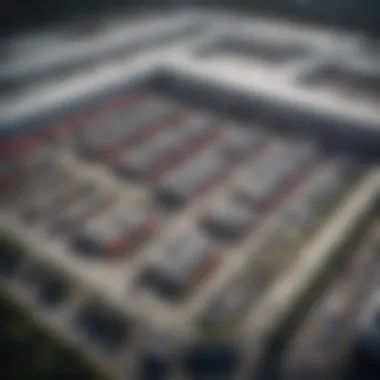Tesla Factory: Innovations and Industry Impact


Intro
The evolution of the automotive industry is reshaping rapidly, and Tesla plays a monumental role in this transformation. The Tesla factory represents a microcosm of innovation in automobile manufacturing. By focusing on advanced technology, production efficiency, and sustainable practices, it sets a benchmark for future manufacturing approaches. This section will lay the groundwork for understanding the implications of Tesla's operational strategies and the unique characteristics that distinguish its factories.
At the forefront of electric vehicle (EV) manufacturing, Tesla has redefined standards that many competitors look to emulate. This discourse will closely examine various aspects of Tesla factories, from the intricate technologies implemented to the efficient workforce management techniques employed, their sustainability initiatives, and the inevitable challenges faced in scaling production. Each factor contributes significantly to Tesla’s influence on the broader automotive landscape.
It is vital to grasp how Tesla’s strategies resonate beyond its immediate operational scope. The insights gleaned here will detail not only the company's internal innovations but also define how they drive the adoption of electric vehicles globally. Through understanding these dynamics, we can better appreciate the future trajectory of mobility as influenced by Tesla's revolutionary endeavors.
Foreword to the Tesla Factory
The Tesla Factory represents more than just a manufacturing site; it is the epicenter of innovation for electric vehicles and sustainable technology. With its advanced production techniques and commitment to sustainability, the factory reshapes traditional manufacturing paradigms. Understanding this facility's operational framework is crucial for grasping Tesla's influence on the automotive industry. It showcases the unification of cutting-edge automation and human talent in a harmonious ecosystem aimed at optimizing efficiency and product quality.
Key considerations about the Tesla Factory include its role in scaling production to meet growing demand for electric vehicles, as well as its significance in advancing sustainable manufacturing practices. Moreover, the factory exemplifies how a single entity can cause ripples across global markets influencing supply chains, raw material sourcing, and workforce dynamics. The competitive landscape is also affected by Tesla's ability to innovate, raising standards across the automotive sector and prompting both established and emerging players to reevaluate their strategies.
Overview of Tesla’s Manufacturing Philosophy
Tesla's manufacturing philosophy centers around innovation, efficiency, and sustainability. The company does not merely assemble cars; it designs an entire ecosystem conducive to rapid iteration and improvement. Central to this philosophy is the integration of technology with manufacturing processes, incorporating elements of automation and data-driven decision making. This strategic approach accelerates the production cycle and enhances precision.
Additionally, Tesla prioritizes vertical integration, allowing the company to control various aspects of production. This operational strategy enables Tesla to reduce dependency on third parties and improve supply chain reliability, thus ensuring material quality and reducing costs.
Moreover, the emphasis on sustainability is visible in Tesla’s use of renewable energy sources and the intention to minimize waste. For instance, Gigafactory One in Nevada aims to operate on sustainable energy, eventually reaching a zero-carbon footprint. This commitment does not only address global concerns about climate change but also meets the rising consumer demand for environmentally responsible practices in the automotive industry.
The Role of Innovation in Tesla’s Success
Innovation is at the core of Tesla's success. The company continually pushes the boundaries of electric vehicle technology, developing industry-changing products like the Model S and Model 3. These vehicles incorporate features never seen before in the automotive sector, such as over-the-air software updates and autopilot capabilities. This focus on innovation enables Tesla to maintain a leading position in the market despite significant competition.
Noteworthy innovations include:
- Battery Technology: Tesla invests heavily in battery research and development to enhance range and reduce costs.
- Autonomous Driving: Continuous improvements in artificial intelligence algorithms allow Tesla vehicles to learn from real-world data, enhancing the driving experience.
- Production Techniques: The use of robotics and automation streamlines the assembly process, increasing production capacity and lowering costs.
Tesla's innovative approach fosters a culture that encourages creativity and experimentation. This environment inspires employees to think outside the box, leading to breakthrough ideas that translate into tangible products. Ultimately, the company’s success is deeply intertwined with its relentless pursuit of innovation, positioning it as a trendsetter in the automotive landscape.
"Innovation distinguishes between a leader and a follower." - Steve Jobs
By establishing a culture that embraces innovation and sustainability, Tesla not only advances its mission but also sparks shifts in the automotive industry. As more companies adopt similar practices, the broader implications will redefine expectations for manufacturing and consumer choices globally.
Global Locations of Tesla Factories
Tesla's global presence significantly enhances its manufacturing efficacy and ability to adapt to diverse markets. Each factory serves a specific purpose, allowing Tesla to reduce logistics costs and streamline production. These facilities enable quicker responses to regional demands while increasing overall production capabilities. Furthermore, strategically placed factories help Tesla capitalize on local incentives and regulations aimed at promoting sustainable energy.
Gigafactory One: The Nevada Facility
Gigafactory One, located in Nevada, is pivotal to Tesla's supply chain. This facility primarily focuses on battery production, aiming to create lithium-ion batteries at an unprecedented scale. By doing so, Tesla can ensure that production meets the growing demand for electric vehicles.
Furthermore, producing batteries locally minimizes transportation costs and enhances efficiency. Gigafactory One also demonstrates Tesla's commitment to renewable energy as it aims to operate on sustainable energy sources, significantly reducing its carbon footprint.


Gigafactory Shanghai: Expansion in Asia
Gigafactory Shanghai is Tesla’s first manufacturing plant in Asia and signifies the company's intent to tap into the rapidly growing Asian electric vehicle market. This facility not only focuses on the production of the Model 3 and Model Y but allows Tesla to significantly reduce shipping times and tariffs when selling to Asian countries.
Establishing a factory in Shanghai also positions Tesla closer to its supply chain resources, shortening the time from production to delivery. Tesla’s expansion in China shows its strategic approach to overcoming global competition by localized production, ultimately enhancing its market penetration.
Gigafactory Berlin: Tackling European Markets
With the establishment of Gigafactory Berlin, Tesla aims to address and satisfy the European demand for electric vehicles directly. This factory is designed to produce batteries, powertrains, and vehicles, catering specifically to European consumers. By producing in Europe, Tesla reduces logistical delays and costs associated with exporting vehicles from the U.S.
Moreover, Tesla's choice of Berlin underlines its commitment to sustainability and local job creation. The factory is expected to adhere to stringent European environmental standards, further solidifying Tesla's reputation as a leader in eco-friendly automotive technology.
The Role of Future Facilities
Looking ahead, Tesla plans to expand its manufacturing footprint with additional factories worldwide. Future facilities will likely focus on meeting the increasing global demand for electric vehicles, particularly in regions like India and Southeast Asia. Moreover, establishing more factories could allow Tesla to explore localized production of emerging technologies, such as autonomous driving systems.
Manufacturing Techniques at Tesla
Manufacturing techniques at Tesla play a crucial role in the company's ability to scale production and maintain a competitive edge in the electric vehicle market. By integrating advanced manufacturing methods, Tesla not only enhances efficiency but also improves product quality and reduces costs. In a rapidly evolving automotive landscape, these techniques are essential for meeting the growing demand for electric vehicles while ensuring sustainability and innovation.
Automation and Robotics in Production
Automation and robotics are at the forefront of Tesla's production process. By utilizing state-of-the-art robotic systems, Tesla automates various manufacturing tasks. This results in minimal human error and consistent product quality. For instance, the robots used in the assembly line can quickly assemble vehicles, applying precision that is hard to achieve manually. This technology allows Tesla to ramp up production capacity significantly, which is essential to keep up with market demands.
The implementation of automation does come with its challenges. While robots can enhance efficiency, they also require ongoing maintenance and updates to software and hardware. Additionally, the training of human workers to work alongside robots remains critical. However, the long-term benefits of reduced labor costs and increased production speed outweigh these concerns.
Lean Manufacturing Principles
Lean manufacturing principles guide Tesla's production philosophy, focusing on minimizing waste while maximizing productivity. This approach emphasizes efficiency in every step of the manufacturing process. Tesla aims to produce high-quality vehicles with minimal resources and time.
To achieve this, Tesla employs various strategies such as:
- Continuous Improvement: Regularly analyzing and refining processes to eliminate inefficiencies.
- Value Stream Mapping: Identifying every step in the production process to ensure resources are used effectively.
- Employee Involvement: Engaging employees in decision-making to identify areas for improvement.
These principles not only lead to cost savings but also foster a culture of innovation within the company. By encouraging feedback and input from all levels of the workforce, Tesla can adapt quickly to changes in technology and market demand.
Just-In-Time Production Strategies
Just-In-Time (JIT) production is another key technique leveraged by Tesla. This approach focuses on producing vehicles only when there is demand. By minimizing inventory levels, Tesla reduces the costs associated with excess production and storage. JIT necessitates a well-coordinated supply chain and logistics strategy to ensure that parts arrive exactly when needed.
One challenge of JIT is the reliance on a seamless supply chain. Delays in any part of the process can disrupt production. However, Tesla's integrated supply chain strategy, coupled with its strong relationships with suppliers, has allowed them to effectively implement JIT. This strategy not only enhances cash flow but also improves overall operational efficiency.
"Innovation in manufacturing techniques is essential for Tesla to maintain its leadership in the electric vehicle market. Each method employed contributes significantly to production efficiency and product quality."
Supply Chain Management
Supply chain management is a critical element in the operational effectiveness of Tesla. The automotive industry, particularly in electric vehicles, demands precision and efficiency in sourcing materials and logistics. Effective supply chain management ensures continuity of production and the ability to meet consumer demand efficiently. For Tesla, this involves meticulous planning, real-time coordination, and strategic sourcing to maintain its competitive edge in a rapidly evolving market.


Challenges in Sourcing Materials
The quest for high-quality and sustainable materials poses significant challenges for Tesla. Electric vehicle production relies heavily on lithium, cobalt, nickel, and other resources critical for battery manufacturing. The availability of these materials can fluctuate due to geopolitical tensions and environmental regulations.
- Geopolitical Factors: Many key materials are sourced from countries with unstable political climates, affecting supply stability.
- Environmental Concerns: Sourcing practices can lead to environmental degradation, pushing companies towards more sustainable options.
- Cost Variability: Price volatility in raw materials can impact profit margins.
Tesla seeks to mitigate these challenges through strategic partnerships and long-term agreements with suppliers. This approach not only stabilizes pricing but also fosters innovation in sustainable materials.
Strategies for Efficient Logistics
Efficient logistics plays a crucial role in the overall supply chain management at Tesla. Transporting materials and shipping finished vehicles require a fine-tuned logistical framework. Key strategies include:
- Just-in-Time Delivery: This minimizes inventory costs while ensuring that materials arrive exactly when needed, enhancing efficiency.
- Local Sourcing: Sourcing materials closer to manufacturing facilities reduces transportation costs and carbon footprint.
- Advanced Analytics: Utilizing data analytics for route optimization helps in reducing delivery times and costs.
Efficient logistics not only lowers operational costs but also enhances Tesla's responsiveness to market changes.
The blend of these strategies results in an agile supply chain capable of adapting to challenges while supporting Tesla's ambitious growth targets.
Sustainability Initiatives
Sustainability initiatives are central to Tesla's mission and operations. As the automotive industry undergoes significant transformations towards greener practices, Tesla stands out by integrating sustainability into its core functions. This approach presents numerous benefits, not only for the environment but also for the company itself, shaping its reputation and setting industry standards.
Renewable Energy Integration
Tesla has been at the forefront of renewable energy integration in its factories. The company aims to use renewable energy sources to power its manufacturing facilities. This effort includes the deployment of solar panels and energy storage systems such as the Tesla Powerwall and Powerpack. By utilizing solar energy, Tesla can reduce its carbon footprint drastically.
The benefits extend beyond carbon neutrality. Utilizing solar energy can lower operational costs over time. It also provides a reliable energy source that is less subject to market fluctuations. Tesla’s focus on sustainability allows the company to market itself as a leader in environmental responsibility. They are not just manufacturing electric vehicles but also paving the way for sustainable energy solutions.
"The shift to renewable energy in our factories is a critical component of our overarching strategy to create a sustainable energy ecosystem."
Recycling Programs and Materials Handling
Recycling programs are an essential part of Tesla’s sustainability framework. The company understands the impact of waste generated during production. Tesla implements comprehensive recycling programs for materials such as aluminum, plastics, and battery components.
The approach to materials handling is also optimized. By focusing on the circular economy, Tesla aims to minimize waste and promote the reuse of materials. This not only reduces the environmental impact but can also yield cost savings in materials procurement. The importance of recycling is especially pronounced in battery production, where rare materials are involved. Efficient recycling can mitigate supply chain challenges and reduce dependency on new raw materials.
In summary, Tesla's sustainability initiatives are a testament to its commitment to the environment. The integration of renewable energy and robust recycling programs positions Tesla not just as an automaker but as a leader in sustainability within the industry. Their actions may inspire competitors to adopt similar practices, further accelerating the drive towards sustainable manufacturing.
Workforce Management
In the context of Tesla factories, effective workforce management proves crucial for the overall success and sustainability of operations. A well-managed workforce can significantly enhance productivity levels, improve employee morale, and foster innovation. As Tesla strives to redefine the automotive industry, the human element within its manufacturing processes remains indispensable. This section will explore how Tesla prioritizes training and development, as well as strategies for employee satisfaction and retention.
Training and Development Programs
Training and development programs are fundamental components of Tesla's approach to workforce management. With rapid advancements in technology and production techniques, ongoing employee training ensures that workers possess the necessary skills to adapt and thrive. Programs typically include:
- Technical Skills Training: Employees receive instruction on state-of-the-art machinery and technology relevant to electric vehicle production.
- Safety Protocols: Ensuring a safe workplace is paramount. Employees undergo rigorous safety training to minimize risks associated with manufacturing tasks.
- Leadership Development: Future leaders are identified and groomed through specialized courses aimed at cultivating managerial skills and strategic thinking.


By investing in such training initiatives, Tesla not only enhances individual capabilities but also strengthens the overall competency of the workforce. Employees who feel equipped with the right skills are more likely to contribute creatively to problem-solving and innovation within the factory.
Employee Satisfaction and Retention Strategies
A content workforce plays a vital role in achieving organizational efficiencies. Tesla recognizes that employee satisfaction directly correlates with productivity and retention. Key strategies utilized by the company include:
- Competitive Compensation: Offering salaries and benefits that align with industry standards helps in attracting and keeping top talent.
- Positive Work Environment: Creating a culture of inclusiveness and collaboration encourages employees to share ideas and collaborate effectively.
- Feedback Mechanisms: Regular surveys and feedback sessions allow employees to voice concerns or suggestions, thus fostering a sense of belonging and ownership.
"An engaged employee is far more valuable than just one who shows up for a paycheck."
These strategies align with Tesla’s goal of developing a resilient workforce capable of supporting the company's ambitious growth objectives. As Elon Musk emphasizes innovation and progress, maintaining employee satisfaction remains critical to achieving those goals.
The Future of Tesla Factories
The future of Tesla factories is a critical topic in understanding the overall trajectory of the automotive industry. As global demand for electric vehicles continues to rise, Tesla is not just adapting but also reshaping how automobiles are manufactured. This reshaping includes innovations in production techniques, workforce management, and sustainability practices. Each element is interconnected, influencing overall operational efficiency and consumer perception.
Predictions for Production Growth
As the market shifts towards electric vehicles, Tesla's production capacity is expected to increase significantly. Analysts predict that by 2030, the demand for electric vehicles could rise to over 20 million units annually. In response to this demand, Tesla is already expanding its factories, notably in Berlin and Shanghai. These expansions are not just about square footage; they are about increasing output and efficiency.
Recent estimates suggest that Tesla's Gigafactory in Berlin alone could produce over 500,000 vehicles per year. This type of scaling is crucial if Tesla wishes to maintain its innovative edge while meeting consumer needs. To handle this growth, Tesla must continue to enhance its manufacturing processes and refine its supply chain strategies.
Innovations on the Horizon
Tesla's commitment to innovation is unwavering. The company is leveraging cutting-edge technologies to optimize production. For instance, artificial intelligence and machine learning are beginning to play a significant role in fault detection and quality assurance. These technologies can identify potential problems before they impact production, leading to improved efficiency and reduced waste.
Another exciting prospect is the development of advanced battery technology. Tesla aims to reduce battery costs while increasing range and performance. This innovation would not only enhance Tesla's vehicles but also lower the barrier to entry for consumers considering electric vehicles.
Impact on the Automotive Industry Landscape
The advancements at Tesla factories will not only reshape Tesla’s future but potentially redefine the entire automotive landscape. As Tesla continues to innovate and improve its manufacturing processes, other automakers may be compelled to follow suit. This could lead to a more sustainable and efficient automotive industry. Furthermore, the rise of electric vehicle production will likely influence global policies regarding emissions and sustainability.
"Tesla’s approach to scaling production and innovation sets a new standard that many automakers will strive to match."
By setting a precedent in both production capacity and technological advancements, Tesla could force competitors to re-evaluate their own practices. This dynamic may create a more competitive environment, sparking further innovations in electric vehicle technology.
Epilogue
The conclusion of this article encapsulates the critical role Tesla factories play in shaping the future of automotive manufacturing and electric vehicle adoption. Tesla's innovative approaches are not merely technical innovations; they represent a shift in how the industry views production, supply chain management, and sustainability.
One primary consideration is the impact that Tesla's operational strategies have on overall production efficiency. By integrating automation and robotics into their manufacturing processes, Tesla can scale up output without sacrificing quality. This efficiency is crucial as demand for electric vehicles increases globally. Furthermore, the sustainable practices adopted in factories not only minimize their carbon footprint but also set a precedent for other manufacturers in the industry, reinforcing the importance of environmental responsibility.
Summary of Key Takeaways
- Innovative Manufacturing: Tesla's unique approach to manufacturing emphasizes automation and lean principles, leading to higher efficiency.
- Sustainability: Their factories harness renewable energy and implement recycling programs effectively, which contributes to a greener automotive industry.
- Workforce Management: Training and employee satisfaction are prioritized to ensure a skilled and committed workforce, vital for ongoing innovations.
- Global Reach: Expansion in various locations streamlines logistics and allows Tesla to respond swiftly to market demands.
- Industry Influence: Tesla's innovations are reshaping the automotive landscape and influencing competitors and new entrants alike.
Final Thoughts on Tesla’s Influence
Tesla is not just a company; it serves as a catalyst for change in automotive manufacturing. Its focus on innovative production methods and sustainability has set new standards. Automotive enthusiasts and professionals must recognize how these changes impact the broader industry.
Furthermore, Tesla contributes to the dialogue on renewable energy and climate change, positioning itself as a leader for future mobility solutions. The ambitious goals set by Tesla's leadership challenge not only traditional automakers but also push the boundaries of what is possible in manufacturing technology.
In summary, Tesla's influence extends beyond its own factories and products. It inspires an entire industry to rethink practices, embrace sustainability, and innovate continuously to meet the demands of an evolving world.



